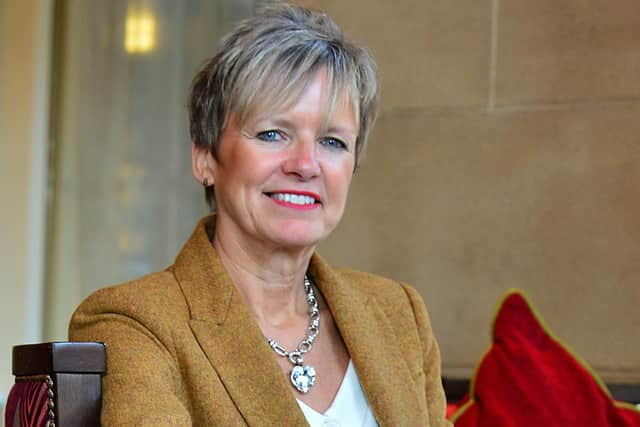Judith Gillespie says sexual assaults by male officers ‘not uncommon when I joined up’ in wake of Sarah Everard murder by Wayne Couzens
and live on Freeview channel 276
She was speaking to the News Letter after serving Met Police officer Wayne Couzens was convicted of kidnapping, raping and murdering Sarah Everard in London.
Since then former Nottingham Police chief Sue Fish has gone public to say that in her career, sex on duty was seen by some of her colleagues “as being a perk of the job” – and that she was sexually assaulted at work by a more senior officer.
Advertisement
Hide AdAdvertisement
Hide AdMs Gillespie has now said she too would have been aware of sexual misconduct against female officers – from sexual harassment to sexual assault.


“One case was brought to my attention of an officer who had developed a relationship with a vulnerable victim,” she said.
“It was a consensual relationship but it was totally unethical.”
The officer concerned was held accountable.
While a senior officer she also dismissed another officer whose behaviour “gave rise to serious concern” in relation to allegations of sexual misconduct.
Advertisement
Hide AdAdvertisement
Hide AdAfter she joined the force (then the RUC) in 1982 she was aware of female officers being sexually harassed, something which decreased as female recruitment rose.
Sometimes she felt able to challenge the officers responsible but not always. “Perhaps they were in a senior position or the context just didn’t allow me to feel empowered to challenge them.”
She was also aware of sexual assaults on female officers in the early 1980s. “From talking to other women in the job at the same time ... it [sexual assaults] was not uncommon. Certainly harassment, inappropriate jokes, horseplay, practical jokes – that was very common. And perhaps less common, but not uncommon, would have been sexual assaults.”
And just as Sue Fish had said, the victims generally had to keep silent. “You could say that because really there wasn’t the support network for women who wanted to come forward”.
Advertisement
Hide AdAdvertisement
Hide AdShe added that this was a problem across many professions in that era, such as teaching and nursing.
Asked if she believes there will still be officers of the same mentality as Wayne Couzens in policing today, she said police services worldwide “have really struggled” with effective vetting but that it is becoming “more and more sophisticated”.
Asked if the PSNI needs to carry out specific work to prevent a Wayne Couzens-type situation, she said: “There are going to be lessons for every police service across these islands and I think the fact that an independent inquiry has been announced is a good thing.” However, she added that the PSNI has led the way on many related issues, for example, inviting training from Women’s Aid.
“The true measure [for the PSNI going forward] is how they deal with people who come forward and complain. Are they vilified? Is there victimisation?”
Advertisement
Hide AdAdvertisement
Hide AdIn her time she attempted to ensure officers making such complaints were strongly protected. “That policy needs to develop as well so that everyone needs to feel emboldened and empowered and say what needs to be said, rather than put their heads down – as I would have done in my early career.”
Meanwhile, the chair of the Policing Federation in NI, Mark Lindsay, has rejected suggestions that the PSNI must take on board reforms to prevent a Sarah Everard type-murder in NI.
The Alliance Party MLA John Blair has said that the PSNI, “along with other major institutions, needs to outline the measures they are taking to prevent a repeat of the Sarah Everard case occurring here”.
But Mr Lindsay said police in NI “are far more intensively vetted than many of their colleagues in England and Wales anyway”. He added: “What we can’t lose track of is that the Sarah Everard case was a one off. This was a particularly evil man who - no matter what profession he had gone into - probably would have used his position to carry out the crimes that he did.” Regarding Mr Blair’s comments that “misogyny is deeply rooted into our institutions”, Mr Lindsay replied that the PSNI operates “a very strict neutral working environment” and that many women are now “rightfully moving up through the ranks”.
MORE NEWS:
Advertisement
Hide AdAdvertisement
Hide AdA message from the Editor:
Thank you for reading this story on our website. While I have your attention, I also have an important request to make of you.
With the coronavirus lockdown having a major impact on many of our advertisers - and consequently the revenue we receive - we are more reliant than ever on you taking out a digital subscription.
Advertisement
Hide AdAdvertisement
Hide AdSubscribe to newsletter.co.uk and enjoy unlimited access to the best Northern Ireland and UK news and information online and on our app. With a digital subscription, you can read more than 5 articles, see fewer ads, enjoy faster load times, and get access to exclusive newsletters and content. Visit https://www.newsletter.co.uk/subscriptions now to sign up.
Our journalism costs money and we rely on advertising, print and digital revenues to help to support them. By supporting us, we are able to support you in providing trusted, fact-checked content for this website.
Alistair Bushe
Editor